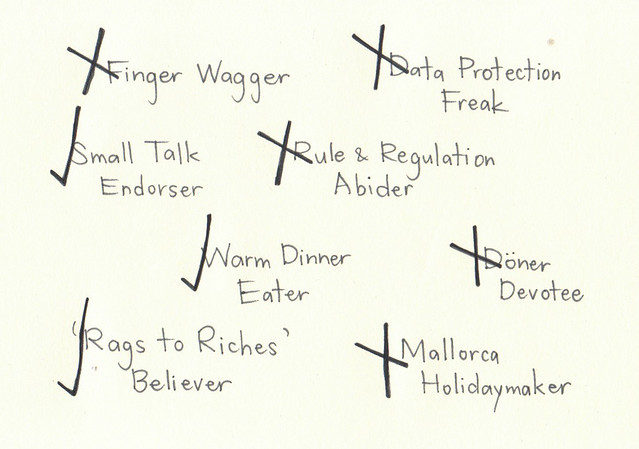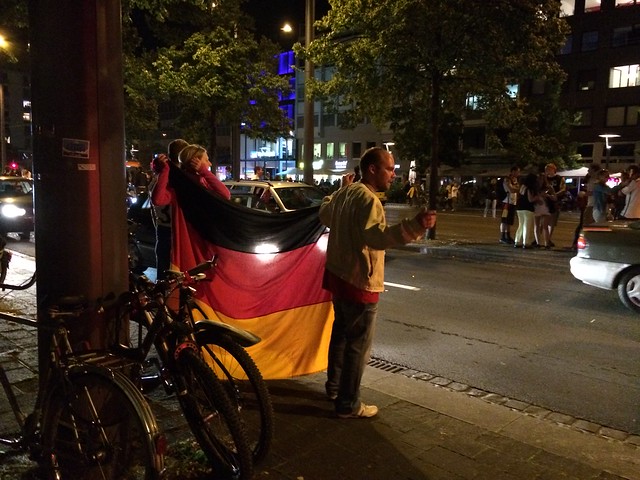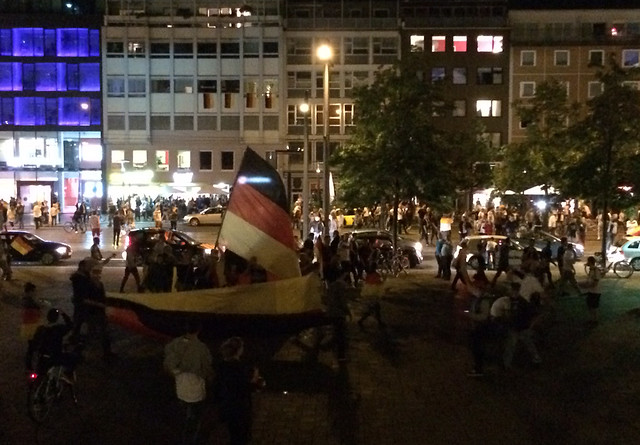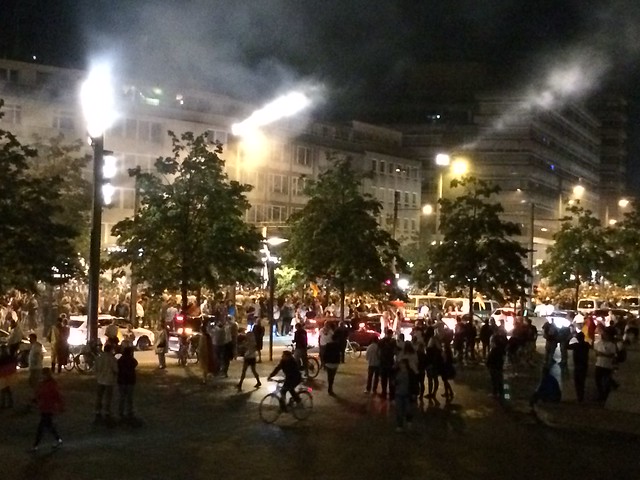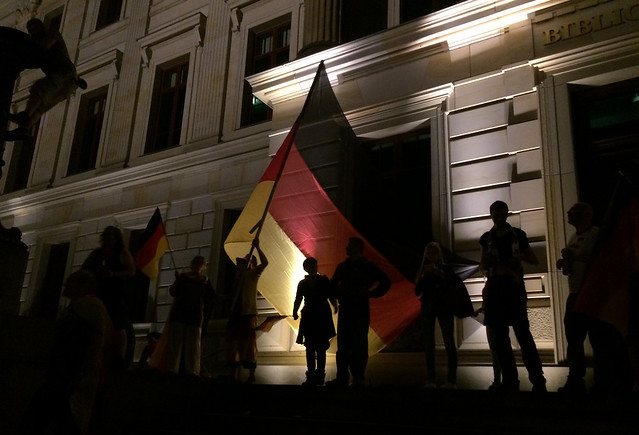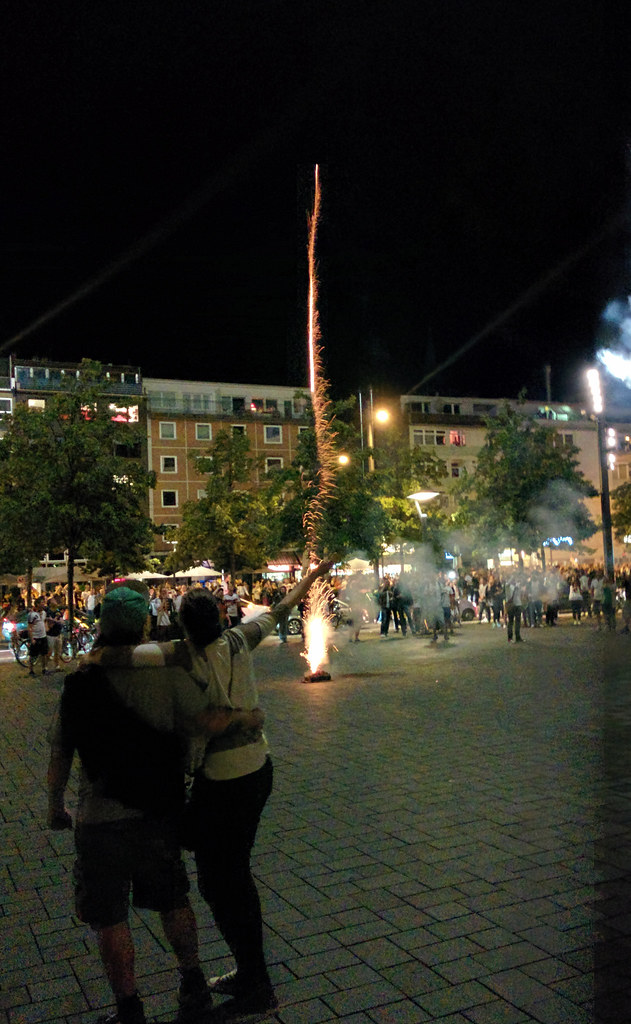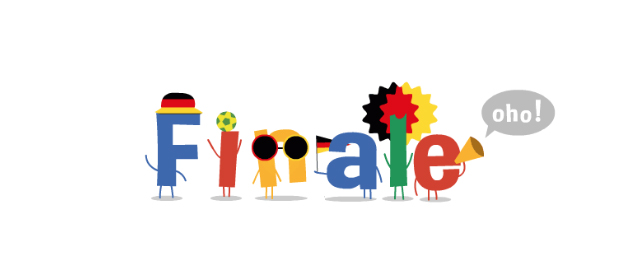Most people associate the holidays with visiting family and/or going "home." When you live abroad and this isn't always possible, however, you learn to appreciate different Christmas traditions. Most of my students cringed when I told them how I celebrated 25th December in Oz a few years ago. Christmas in the summertime? How outlandish! Looking back, I have nothing but fond memories of how I've spent Christmas over the years.

Christmas in Canada
There's this stereotype that us North Americans all celebrate Christmas on 25th December, and I can't speak on behalf of the Canadians that do, because I grew up having a feast in the evening of the 24th with my big fat Filipino family. Uncle Rod had the honours of handing out all the gifts at midnight, and when my cousins and I were kids he even dressed up as Santa Claus!
For my sister and I, Christmas Day wasn't as big a deal as Christmas Eve. Nevertheless, we loved waking up and running down the stairs to find presents from Santa (aka our parents) under the tree. They also put wee presents in our stockings hanging by the fireplace. When I was much younger I left out cookies and milk for Santa, which he obediently ate haha.
It almost always snowed at Christmastime in my childhood, though nowadays white Christmases in Toronto are hit or miss. The strongest memory I have of Christmas actually doesn't involve presents, but instead, music. My dad used to blast the Jackson 5 Christmas album as early as November, much to my dismay. The only other album I know all the lyrics to is Mariah Carey's 1994 Merry Christmas album.

Christmas in Australia
Truth be told, the main difference between Christmas in Canada and Christmas in Australia is the climate. I was living in Melbourne at the time, and all the shops in the city were decorated with festive lights, adorned in wintery motifs. The city was dotted with artificial Christmas trees, which was appalling because it was 25-30°C at the time! Link to my old blog post [2010] Christmas in Melbourne here.
Sure, Christmas in Oz is a bit tacky, but trust me, everyone back home freezing in -10°C weather is secretly jealous that you get to bbq on the beach in shorts and a t-shirt (a typical Christmas tradition). Surrounded by fellow backpackers, I, too, had a bbq not far from the beach (St. Kilda Beach) back in Christmas 2010. It remains one of the most memorable Christmases I've ever had, not just because it was summertime, but because although it was my first Christmas away from home, I still felt "at home."

Christmas in Germany
Everybody knows that the best thing about Christmas in Germany are the Christmas Markets. Steeped in tradition that goes back hundreds of years, you couldn't even begin to compare these markets with the ones that have been popping up in North America over the past few years. The Toronto Christmas Market, for example, lacks a certain charm, I find. Not hating, just saying.
The tradition of Nikolaus is another thing I love about Christmas in Germany. You're supposed to clean your boot the evening before he comes and leave it just outside your front door. On 6th December, Nikolaus fills your boot with treats such as chocolates, mandarin oranges and walnuts - but only if you've been a good girl or boy. I know this because Nikolaus visited me for the first time back in 2012!
Yet another tradition I've only seen at Christmastime in Germany is this Weihnachtsplätzchen baking bonanza. Many people dedicate an entire weekend to making Christmas cookies that are meant to last their family and friends at least a few months. Sadly, Germans don't make or eat cookies any other time of year really. I guess after stuffing your face silly with these buttery treats all throughout December, you'd definitely be sick of 'em.
NB: In Germany, Christmas Eve is referred to as the "Holy Night," Christmas Day is called the "1st Christmas Day," and Boxing Day is called the "2nd Christmas Day." Also, from 27th December up until New Year's Eve, the malls are packed with shoppers returning gifts, only it isn't called Boxing Week.

Christmas in __________
The idea for this blog post arose from the current dilemma we have of not knowing what to do this Christmas. The bf's parents are currently in Florida and plan to spend Christmas there, my family's in Canada, and without anyone to celebrate the holidays with here in Germany, I think it only makes sense to celebrate it abroad.
Admittedly, I'm excited beyond words! I love the thought of seeing something new and celebrating Christmas in a completely different country! What I've learned is that you truly can feel "at home" wherever you are for Christmas, you just gotta have an open mind. It may take me a lifetime but I hope to add more and more countries to this list and experience what Christmas is like all around the world.


Christmas in Canada
There's this stereotype that us North Americans all celebrate Christmas on 25th December, and I can't speak on behalf of the Canadians that do, because I grew up having a feast in the evening of the 24th with my big fat Filipino family. Uncle Rod had the honours of handing out all the gifts at midnight, and when my cousins and I were kids he even dressed up as Santa Claus!
For my sister and I, Christmas Day wasn't as big a deal as Christmas Eve. Nevertheless, we loved waking up and running down the stairs to find presents from Santa (aka our parents) under the tree. They also put wee presents in our stockings hanging by the fireplace. When I was much younger I left out cookies and milk for Santa, which he obediently ate haha.
It almost always snowed at Christmastime in my childhood, though nowadays white Christmases in Toronto are hit or miss. The strongest memory I have of Christmas actually doesn't involve presents, but instead, music. My dad used to blast the Jackson 5 Christmas album as early as November, much to my dismay. The only other album I know all the lyrics to is Mariah Carey's 1994 Merry Christmas album.

Christmas in Australia
Truth be told, the main difference between Christmas in Canada and Christmas in Australia is the climate. I was living in Melbourne at the time, and all the shops in the city were decorated with festive lights, adorned in wintery motifs. The city was dotted with artificial Christmas trees, which was appalling because it was 25-30°C at the time! Link to my old blog post [2010] Christmas in Melbourne here.
Sure, Christmas in Oz is a bit tacky, but trust me, everyone back home freezing in -10°C weather is secretly jealous that you get to bbq on the beach in shorts and a t-shirt (a typical Christmas tradition). Surrounded by fellow backpackers, I, too, had a bbq not far from the beach (St. Kilda Beach) back in Christmas 2010. It remains one of the most memorable Christmases I've ever had, not just because it was summertime, but because although it was my first Christmas away from home, I still felt "at home."

Christmas in Germany
Everybody knows that the best thing about Christmas in Germany are the Christmas Markets. Steeped in tradition that goes back hundreds of years, you couldn't even begin to compare these markets with the ones that have been popping up in North America over the past few years. The Toronto Christmas Market, for example, lacks a certain charm, I find. Not hating, just saying.
The tradition of Nikolaus is another thing I love about Christmas in Germany. You're supposed to clean your boot the evening before he comes and leave it just outside your front door. On 6th December, Nikolaus fills your boot with treats such as chocolates, mandarin oranges and walnuts - but only if you've been a good girl or boy. I know this because Nikolaus visited me for the first time back in 2012!
Yet another tradition I've only seen at Christmastime in Germany is this Weihnachtsplätzchen baking bonanza. Many people dedicate an entire weekend to making Christmas cookies that are meant to last their family and friends at least a few months. Sadly, Germans don't make or eat cookies any other time of year really. I guess after stuffing your face silly with these buttery treats all throughout December, you'd definitely be sick of 'em.
NB: In Germany, Christmas Eve is referred to as the "Holy Night," Christmas Day is called the "1st Christmas Day," and Boxing Day is called the "2nd Christmas Day." Also, from 27th December up until New Year's Eve, the malls are packed with shoppers returning gifts, only it isn't called Boxing Week.

Christmas in __________
The idea for this blog post arose from the current dilemma we have of not knowing what to do this Christmas. The bf's parents are currently in Florida and plan to spend Christmas there, my family's in Canada, and without anyone to celebrate the holidays with here in Germany, I think it only makes sense to celebrate it abroad.
Admittedly, I'm excited beyond words! I love the thought of seeing something new and celebrating Christmas in a completely different country! What I've learned is that you truly can feel "at home" wherever you are for Christmas, you just gotta have an open mind. It may take me a lifetime but I hope to add more and more countries to this list and experience what Christmas is like all around the world.


